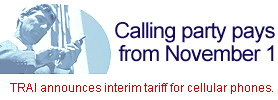

|
|
|
|
| HOME | INFOTECH | HEADLINES | |||
|
September 17, 1999
HEADLINES
|
 The Telecom Regulatory Authority of India today announced interim tariffs and commencement of the calling-party-pays regime for cellular phones from November 1.
The Telecom Regulatory Authority of India today announced interim tariffs and commencement of the calling-party-pays regime for cellular phones from November 1.
Further, he said, CPP would make mobile cellular service more affordable to subscribers, including those receiving calls in rural areas. It also transfers payment responsibility to the calling party, the party that needs to make the call in order to contact the called party. This has been done through an amendment to the Telecommunications Tariff Order 1999 and to the Telecommunications Interconnection (Charges and Revenue Sharing) Regulation 1999, Justice Sodhi explained. He said for the first time different tariffs have been introduced for airtime charge and rentals in metros and circle service areas. For cellular subscribers in metros, the monthly rental will be not more than Rs 475 instead of Rs 500 at present. At the same time, all incoming calls will be free. For outgoing calls from cellular mobile in metros, Rs 4 would be charged for first minute and Rs 2 thereafter for each 30-second duration. In circles, Rs 4.50 will be charged for the first minute and Rs 2.25 thereafter for each 30-second duration. Justice Sodhi said a local call from fixed line to a cellular phone will now be charged with double pulse to begin with and then will have a pulse every 60 seconds. This implies that the duration of the local call from fixed line will be charged Rs 1.60 up to 60 seconds, Rs 2.40 for 60 seconds or more but less than two minutes and Rs 3.20 for two minutes or more but less than three minutes. But these charges apply only if Rs 0.80 is charged per metered call. If Re 1 is charged per metered call, the rates will be Rs 2, Rs 3 and Rs 4 for the same duration. If Rs 1.20 is charged per metered call, the rates will be Rs 2.40, Rs 3.60 and Rs 4.80. Justice Sodhi said the call charge is higher than the local call to basic service subscriber because calls to cellular mobile are premium calls and these call are normally charged at a higher rate in other countries. The higher tariff for local calls to cellular mobile also mitigates to some extent the possibility of a callback arrangement from fixed line to cellular mobile, as does the initial pulse rate of 60 seconds for outgoing calls from a cellular phone. Justice Sodhi said the tariffs specified reflect the effect of the National Telecom Policy 1999 which provides for switchover to a revenue sharing system from a fixed licence fee regime. Justice Sodhi said the reduced ad interim tariffs are based on initial estimates and a long-term tariff regime that will emerge from the TRAI's forthcoming consultation paper. The paper will form the basis of its recommendations on percentage of revenue share that should be charged as licence fee. He agreed there is still a measure of uncertainty about the application of the revenue sharing arrangement for licence fee. Department of Telecommunications and industry concerns such as cash flows and revenue realisations will also be addressed in the course of these consultations. Mahanagar Telephone Nigam is the basic telephony operator for New Delhi and Bombay. When Rediff contacted MTNL Marketing Manager K J Chacko for clarification on the use of coin-slot public phones, he said: "We will have to make some modifications so that users can call cell phones from PCOs. However, as of November 1, I don't think this will be possible because calls from PCOs to cell phones will be disabled at the exchange level. We are considering the idea where meters will be installed on PCOs similar to those in STD/ISD booths. Whatever modifications that need to be made at the exchange level we hope to do so by November 1." Chacko speculates, "Mobile telephone usage will definitely increase because of the CPP regime. But initially, I see a drop in the percentage of calls made from a landline phone to a mobile phone. There is going to be some reluctance on part of those calling from landline phones because they will be the ones paying for the calls. But eventually even this hesitation will disappear." - A Staff Reporter and UNI |
||||
|
HOME |
NEWS |
BUSINESS |
SPORTS |
MOVIES |
CHAT |
INFOTECH |
TRAVEL |
SINGLES BOOK SHOP | MUSIC SHOP | GIFT SHOP | HOTEL RESERVATIONS | WORLD CUP 99 EDUCATION | PERSONAL HOMEPAGES | FREE EMAIL | FEEDBACK |